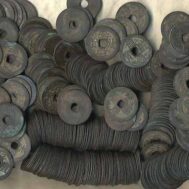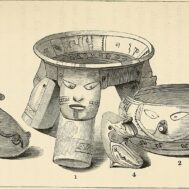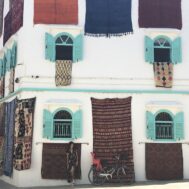Berlin’s Altes Museum has returned 25 antiquities, including 21 Apulian vases, believed to have been illegally excavated and smuggled out of Italy more than forty years ago. Dating back to the 4th century BC, the Apulian vases are adorned with scenes from Greek mythology and were likely used as tomb decorations and grave furnishings. The Antikensammlung Berlin acquired the vases in 1984.
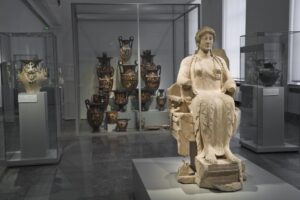
Altes Museum gallery with returned Apulian vases in background. © Antikensammlung / Johannes Laurentius, Berlin.
An agreement for the return of the Altes Museum antiquities was signed mid-June in Berlin at a ceremony attended by Italy’s Culture Minister Gennaro Sangiuliano, Germany’s Culture Minister Claudia Roth, and Italian Ambassador to Berlin Armando Varricchio. The agreement involved antiquities under the management of the Prussian Cultural Heritage Foundation (Stiftung Preussischer Kulturbesitz or SPK), chaired by Hermann Parzinger, and currently displayed at the Altes Museum. The agreement was the result of collaboration between the Italian and German Ministries of Culture, the Foundation, and the Berlin museum.
As a result, a valuable funerary set from Apulia, including 14 vases, ten decorated plates, and a fragment of a fresco from a villa in Boscoreale, will be delivered to Italian cultural authorities. Legal proceedings had been initiated for 21 of the 25 artifacts by the Public Prosecutors’ Offices of Rome and Foggia, with Deputy Prosecutor Rosa Pensa representing the latter at the ceremony. However, the German judicial authority refused to execute the confiscation orders issued by the Rome Public Prosecutor’s Office, citing the Altes Museum’s right to defense as not having been respected during the Italian hearing..
A cooperation agreement between German and Italian cultural authorities was also negotiated as part of the voluntary turnover of the Altes Museum objects. This agreement allows for a four-year renewable loan to German museums from the National Archaeological Museum of Naples and the Archaeological Parks of Paestum and Velia of two painted panels from Lucanian graves, together with ancient bronze armor. Neither type of artifact is well-represented in German collections; there are no paintings of this kind in Berlin museums, according to the Prussian Cultural Heritage Foundation.
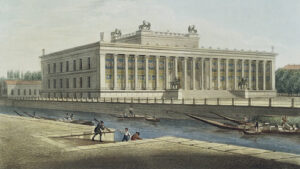
The Königliches Museum auf der Spreeinsel, today’s Altes Museum, opened in 1830 as the first public museum in Berlin. © bpk / SMB / Jörg P. Anders.
In a June 13 ceremony in Berlin, German Culture Minister Claudia Roth handed the objects over to her Italian counterpart, Gennaro Sangiuliano. Roth’s statement at the ceremony focused on crime, saying that, “What today’s repatriation highlights is the deeper meaning of protection, which is to identify and protect cultural property from looting, robbery, smuggling, and illegal excavations. Equally important is the close cooperation between Germany and Italy in this field: so far no other country has received as many returns of illegally traded cultural goods as Italy.”
In contrast, Mario Turetta, Secretary General of the Ministry of Culture, spoke in platitudes regarding the importance of cultural diplomacy and benefits of cooperative work between institutions for the “protection and enhancement” of our cultural heritage.
The Berlin museum acquired the 21 Apulian vases from the Basel art dealer Christoph F. Leon, who claimed they were from a Geneva family that had owned them since 1889. However, investigations into the Italian antiquities dealer Giacomo Medici revealed polaroid photographs of four of the vases – apparently recently excavated – in a 1995 search of his Geneva office.
Hermann Parzinger, president of the Prussian Cultural Heritage Foundation told the Art Newspaper that, “Four of them are proven to have come from illegal excavations—with the others it is not absolutely certain, but there are grounds for strong suspicion.” Parzinger said that although the remaining 17 vases are not proven to be looted, their similarity to the other four suggests they were stolen from the same grave. These vases, dating from around 340 BC, are believed to be from the Foggia area in northern Apulia, a region that has suffered extensive illegal excavations. “We are convinced that it is right to give these objects back.”
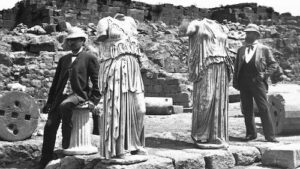
German excavations at Pergamon in the 19th century. Many objects in German museums were acquired under partage agreements to share finds.
Four additional objects with different provenances—three of them also connected to Medici—are also being returned to Italy. Berlin’s state museums began a systematic investigation of the provenance of the state’s archaeological collections in 2023, aiming to repatriate objects that were illegally excavated or exported without explicit permission from their place of origin. Researchers from Berlin and Turkey are currently investigating the provenance of objects from archaeological sites at Sam’al, Didyma, and Samarra in three Berlin museums: the Museum of Islamic Art, Museum for the Ancient Near East, and the Altes Museum classical antiquities collection.
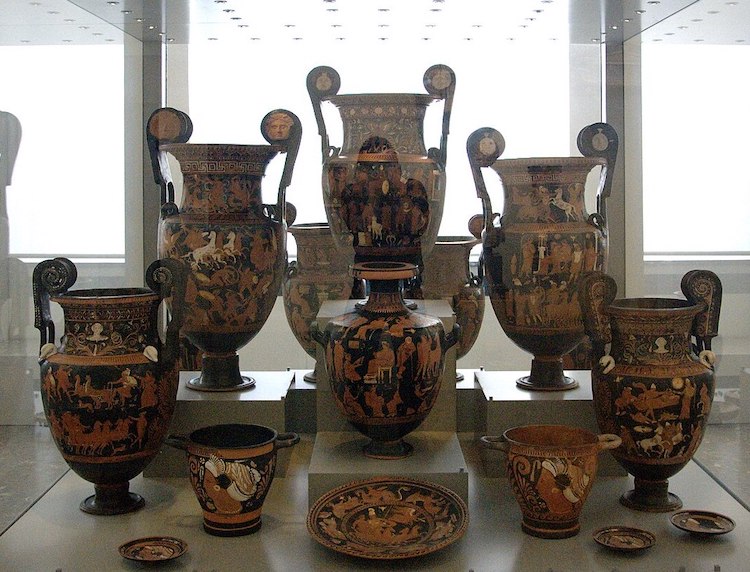 Apulian vases Antikensammlung Berlin, red-figure vases from a grave, ca. 340 BC., acquired 1984, Altes Museum, Berlin, photo Bibi Saint-Pol, public domain.
Apulian vases Antikensammlung Berlin, red-figure vases from a grave, ca. 340 BC., acquired 1984, Altes Museum, Berlin, photo Bibi Saint-Pol, public domain. 